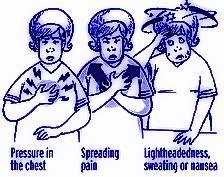WASHINGTON [Reuters, Apr 06, 2006] - The risk of a fatal heart attack rises when the U.S. economy strengthens and increases further if macroeconomic conditions remain robust over the next several years, according to a study published last month.
The death rate rises in the year the economy expands and grows further if the lower rate of joblessness is maintained, Christopher Ruhm wrote in his study.
"The stronger the economy, the greater the incidence of heart attacks,"...is this true? Does this mean that there's something relatively good with the current Philippine fiscal crisis?
 Regardless of gender, the same study showed that a 1 percent drop in unemployment is estimated to raise mortality by 1.3 percent or 2,515 additional deaths per year from heart attacks.
Regardless of gender, the same study showed that a 1 percent drop in unemployment is estimated to raise mortality by 1.3 percent or 2,515 additional deaths per year from heart attacks.What is the psychology behind this? Does this mean that if you've been poor and hungry all your life, and you suddenly hit it big, you are most likely to binge on unhealthy food items making you fat, cholesterol-laden, and ripe for a heart attack?
My opinion is that you can be poor or rich, and still lead a healthy lifestyle. The real problems are poverty of information, willingness to change, ability to execute informed decisions, having the right amount of discipline to maintain a healthy outlook, and being happy enough with the new choices made.
5 reactions:
According to the article, the stronger the economy, the higher the incidence of heart attack. Based on the example given, their's opportunity to earn more-->work more-->no time to exercise-->poor health.
What's the message behind this? We have TO MAKE TIME for ourselves, so we won't fall ill. Keeping fit doesn't need to be expensive. I'm sure we can all think of examples: Say your office is on the second floor. Use the stairs instead of the lift.
ON FISCAL CRISIS (layman's term):
Well, we have official figures on our present economic state. I was appalled at the expenditure pattern on social services. Government's budget for education and health is constantly decreasing. It is in a sorry state.
According to Dr. Villegas, among Phil. presidents, Gloria Arroyo borrowed the most. Where did the money go? A great portion of it was paid on interest and principal of the national debt AND a big chunk lost on corrupt bureaucrats.
The government has no money to pay. So, they impose taxes on sales, petroleum products, among others. She has 8 new tax measures.
Who will bear all these taxes? WE. The ordinary Filipinos. According to figures, minimum wage is at 250/day (base year 2004, any increase?). To survive at subsistence level (poverty level), an average family (6 members) must have an income of 479.06/day.
It's depressing. What a stressful life it really is. Watch your heart. Norvasc is expensive. :)
BAYI: That I also thought of, my friend. Perhaps a larger sample size might confirm his results and see where the exact relationships lie. How are you doing? I look forward in having coffee with you next week. :)
I think 20 heavily-populated states is a big sample for a study.
IPANEMA: Yes, keeping fit does not have to be expensive. I look at farmers in the countryside who eat bowls of white rice, fish, and on lucky days, even slabs of meat, and wonder how they maintain those six-pack abs a city dweller can only get by having a rigorous regular gym workout....*LOL* The unwitting answer of course, lies in physical activity. If all people knew only how to burn all the equivalent food calories they consume, there would certainly be no or less problems of too much weight and having diabetes.
Re: Sample size - maybe large enough to include the populations of other developed countries like Japan or Europe. Behavior towards lifestyle changes rather than an improved, strong economy, I think, plays a far more important role in preventing heart attacks.
Got your point Dr. Emer.
The study focused on the possible effects of a surging economy on people's health, assuming all other factors (macroeconomic) constant.
What's the relationship of a healthy economy to peoples' health? Healthy economy = employment=income=savings=spending.
To sustain that income, a person desires to work more=no time to exercise=poor health.
My thoughts, lol. Economics 101. :)
Post a Comment